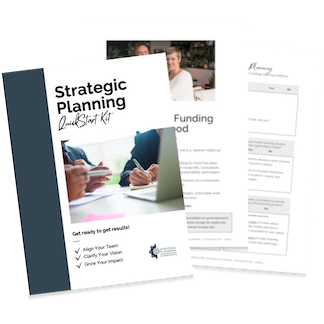Too often, nonprofit and business leaders start a planning process—particularly a strategic planning process—with the goal of uncovering “the one correct” strategic direction for their organization. But the reality is usually far more nuanced. The best strategic plans often integrate unexpected insights. Which is why we wanted to take a moment to talk about why creativity is important in strategic planning.
Why Is Creativity Important in Strategic Planning?
When you hear the words “creative thinker,” what do you picture? Here at Funding for Good, we think of things like:
- Innovator
- Problem-solver
- Visionary
- Artist
- Entrepreneur
Unfortunately, some people consider themselves “not creative” simply because they failed art class in elementary school or haven’t launched a tech start-up.
But the truth is that everyone has the potential for creativity and creative thinking. The trick is establishing the right conditions for creativity to flourish.
For us here at Funding for Good, creative thinking is about being able to see the challenge in front of us in a new way. Creativity in planning requires intentionally creating space for the unexpected.
The challenges you’re facing could be as simple as a blank page or as complex as the strategic direction of an established but struggling institution. But creativity can help you tackle these challenges and more. That’s why we believe creative thinking is such an important element in strategic planning.
How to Use Creative Thinking in Strategic Planning
So, how can you leverage the power of creativity in your strategic planning process?
Start with a Clear and Structured Process
If your strategic planning process is overly complex or unclear, your board and staff will spend much of their time wondering what is actually happening. They’ll focus on trying to understand the process rather than engaging with the substance.
That’s why Funding for Good has designed a proven three-step strategic planning process. We’ve found that a clear and efficient strategic planning process gives your team more time to focus on what matters—creating a sustainable organization.
Trust Your Facilitator
A great facilitator can mean the difference between experiencing an incredible and energizing strategic planning process, versus dealing with a messy project that will never end. Your strategic planning facilitator is like your organization’s tour guide. They will make sure you see the main sights and keep on schedule, while also drawing on their depth of knowledge and experience to keep your team actively engaged.
Strategic Planning: What to Expect When Selecting a Facilitator
Trusting your facilitator enables your board and staff leadership to be participants in the process—rather than having to run it themselves. This creates space for new ideas, insights, and observations to emerge.
And these new ideas might just lead to the kind of innovation you’re looking for.
Encourage Participants to Make Unexpected Connections
Making unexpected connections is where the magic of creativity happens. People often assume that creativity—whether a gripping novel or a beautiful song—emerges out of thin air.
But for many of the most creative and innovative people out there, creative thinking is about seeing the connections between seemingly unrelated details. That’s why it’s vital to not disregard small details or observations simply because they don’t fit into your current vision.
A recent piece at Entrepreneur reveals more about this powerful approach:
We live in a world that offers endless opportunities to ponder, discover and investigate ideas. And every time you embrace one of those opportunities, you develop your curiosity. And perhaps more importantly, you create a deeper well of experience to draw on. By soaking in all that new information, you have a broader set of ideas to apply to your current challenges and iterate on. That’s the best-kept secret to cultivating creativity and innovation.
Examples of this sort of innovation are all around us. Whether it’s the archaeologist who may have discovered Cleopatra’s tomb or the latest young tech entrepreneur making waves, detailed observation and creative thinking go hand in hand. Which is why creativity is so important in strategic planning.


